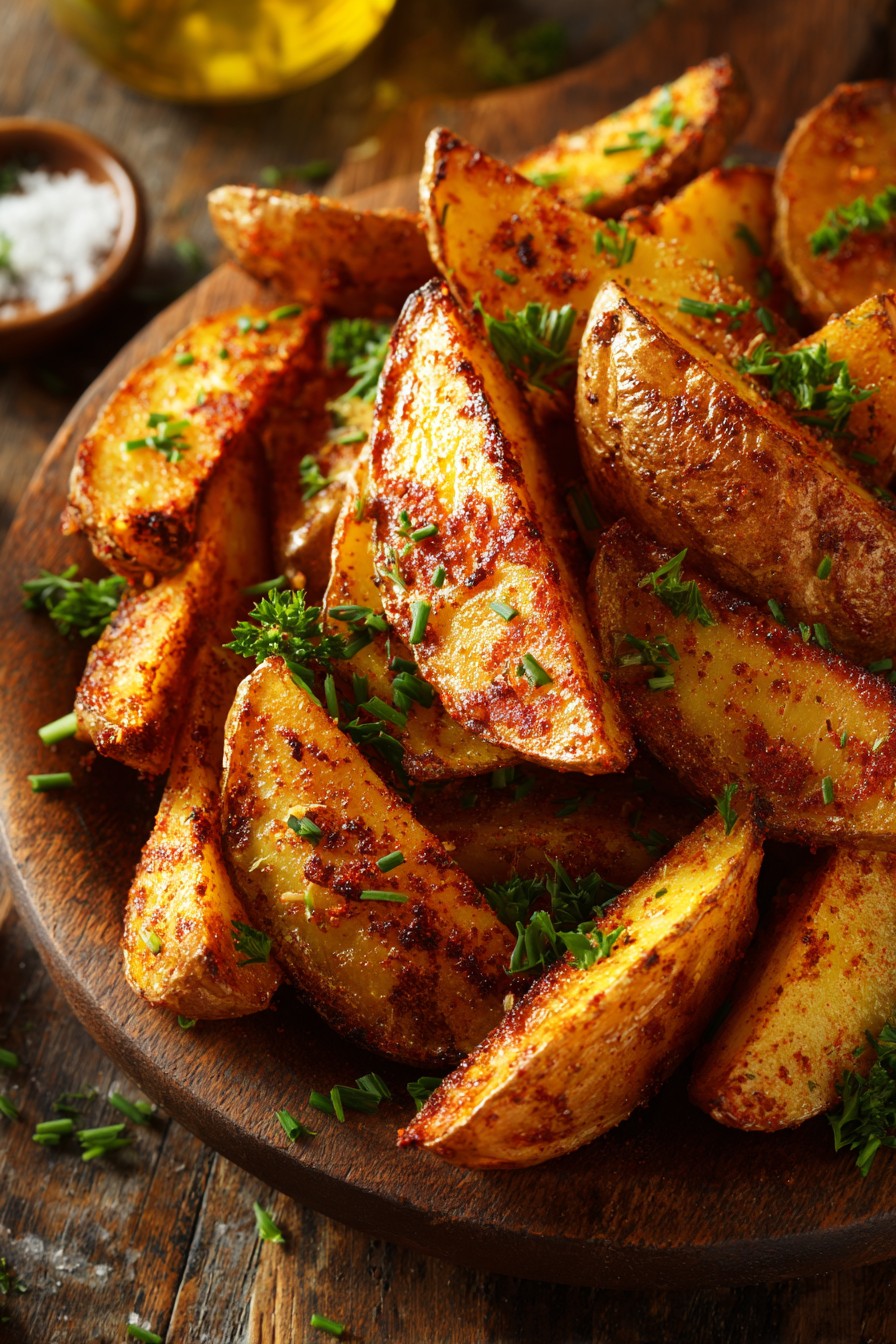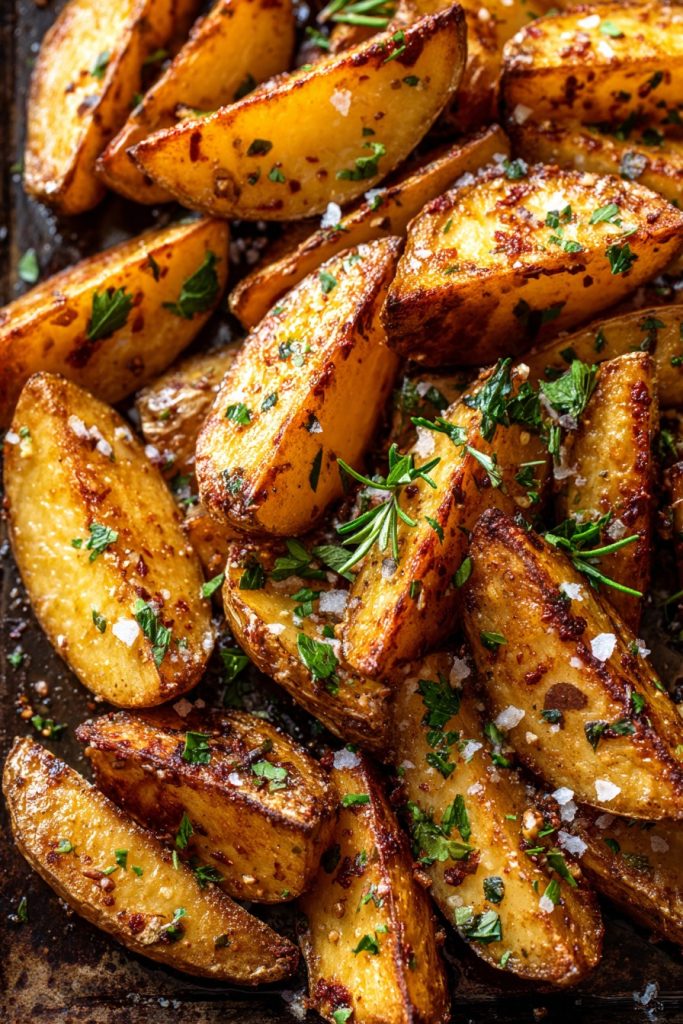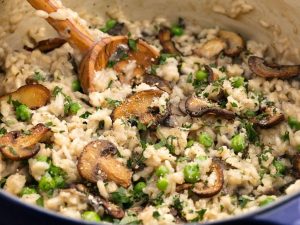Wondering how to transform humble potatoes into a nutrient-dense, flavor-packed side dish that complements any grilled meal? Welcome to the ultimate guide for achieving perfectly grilled potatoes with crispy exteriors and fluffy interiors. Whether you’re hosting a summer barbecue or preparing a weeknight dinner, this method delivers exceptional results while maximizing the nutritional benefits of this versatile tuber.
Why This Recipe Works
- Par-boiling potatoes before grilling ensures they cook through evenly while developing that desirable crispy exterior, preventing the common pitfall of burnt outsides with raw centers that plagues many grilled potato attempts
- The combination of olive oil and strategic seasoning creates a flavorful crust while providing heart-healthy monounsaturated fats that help your body absorb the fat-soluble vitamins present in potatoes
- Cutting potatoes into uniform wedges maximizes surface area for optimal browning and allows for better heat distribution, resulting in consistent texture throughout every bite
- Grilling over medium-high heat with proper spacing prevents steaming and promotes caramelization, enhancing the natural sweetness of the potatoes while developing complex Maillard reaction flavors
- Finishing with fresh herbs after grilling preserves their delicate flavors and nutritional compounds that would be destroyed by direct heat, adding bright freshness to balance the smoky, savory notes
Ingredients
- 2 pounds russet potatoes, scrubbed and cut into 1-inch wedges
- 3 tablespoons extra virgin olive oil
- 1 teaspoon garlic powder
- 1 teaspoon smoked paprika
- 1/2 teaspoon black pepper, freshly ground
- 1 teaspoon sea salt, divided
- 2 tablespoons fresh parsley, finely chopped
- 1 tablespoon fresh chives, minced
- Optional: 1/4 teaspoon cayenne pepper for heat
Equipment Needed
- Grill (gas or charcoal)
- Large pot for boiling
- Colander
- Large mixing bowl
- Tongs
- Cutting board and chef’s knife
- Measuring spoons
- Instant-read thermometer (optional but recommended)
Instructions

Prepare and Par-Boil the Potatoes
Begin by thoroughly scrubbing 2 pounds of russet potatoes under cold running water to remove any dirt or debris, as the skin contains valuable nutrients like fiber and potassium that we want to preserve. Cut each potato lengthwise into 1-inch wedges, ensuring relatively uniform sizes for even cooking. Place the wedges in a large pot and cover with cold water by about 1 inch, then add 1/2 teaspoon of sea salt to the water. Bring to a rolling boil over high heat, then reduce to a gentle simmer and cook for 8-10 minutes until the potatoes are just tender when pierced with a fork but still firm enough to hold their shape. This par-boiling step is crucial because it gelatinizes the starches near the surface, which will create that beautifully crispy exterior during grilling while ensuring the interiors become perfectly fluffy. Drain the potatoes in a colander and let them steam dry for 5 minutes – this drying period helps achieve maximum crispiness.
Season the Potato Wedges
Transfer the slightly cooled, dried potato wedges to a large mixing bowl where you’ll add 3 tablespoons of extra virgin olive oil, making sure to coat each wedge thoroughly. The olive oil not only prevents sticking but also provides healthy monounsaturated fats that support heart health and help your body absorb the fat-soluble vitamins present in potatoes. Sprinkle over 1 teaspoon of garlic powder, 1 teaspoon of smoked paprika, 1/2 teaspoon of freshly ground black pepper, and the remaining 1/2 teaspoon of sea salt, then toss gently to ensure even distribution. For those who enjoy a bit of heat, this is the perfect time to add 1/4 teaspoon of cayenne pepper. The seasoning mixture should lightly coat each wedge without clumping – if needed, you can toss in two batches to ensure thorough coverage. Let the seasoned potatoes rest for 5 minutes to allow the flavors to penetrate slightly.
Preheat and Prepare the Grill
While the potatoes are resting, preheat your grill to medium-high heat, aiming for a surface temperature of approximately 400-450°F. If using a gas grill, turn all burners to medium-high and close the lid for 10-15 minutes until thoroughly heated. For charcoal grills, arrange hot coals in a single layer and wait until they’re covered with gray ash. Clean the grill grates thoroughly with a stiff wire brush to remove any residue from previous use, then lightly oil the grates using tongs and a paper towel dipped in vegetable oil – this prevents sticking and promotes those beautiful grill marks. The properly heated and cleaned grill surface is essential for achieving the ideal sear without the potatoes tearing when you attempt to flip them later in the cooking process.
Grill the Potatoes to Perfection
Carefully place the seasoned potato wedges on the preheated grill in a single layer, making sure to leave about 1/2 inch of space between each wedge to allow for proper air circulation and even cooking. Close the grill lid and cook for 6-8 minutes until well-marked and golden brown on the first side – you should see distinct grill marks and the edges beginning to crisp. Using tongs, flip each wedge and continue grilling for another 6-8 minutes with the lid closed. The potatoes are ready when they’re tender throughout (test with a fork or instant-read thermometer showing 205-210°F internally) and have developed a crispy, browned exterior on both sides. Avoid moving them excessively during cooking, as this prevents proper browning and can cause them to break apart.
Finish and Serve Immediately
Once the potatoes have reached the ideal internal temperature and exterior crispiness, transfer them to a serving platter using tongs. Immediately sprinkle with 2 tablespoons of finely chopped fresh parsley and 1 tablespoon of minced fresh chives – adding herbs after grilling preserves their delicate flavors and nutritional compounds that would be diminished by direct heat. The fresh herbs provide not only vibrant color but also additional antioxidants and phytonutrients that complement the potatoes’ nutritional profile. Serve the grilled potatoes immediately while they’re hot and crispy for the best texture and flavor experience. These make an excellent side dish for grilled proteins like chicken or fish, or can be enjoyed as part of a vegetable-focused meal with a fresh green salad.
Tips and Tricks
For those seeking to elevate their grilled potato game beyond the basic recipe, several advanced techniques can enhance both flavor and nutritional value. Consider experimenting with different potato varieties – while russets provide excellent fluffiness, Yukon Gold potatoes offer a naturally buttery flavor and creamy texture, and red potatoes hold their shape particularly well with a firmer bite. Each variety brings slightly different nutritional profiles, with red potatoes containing more antioxidants in their skins and Yukon Golds providing additional vitamin A. When par-boiling, adding a tablespoon of vinegar to the water can help the potatoes maintain their structural integrity during grilling, particularly useful if you’re working with waxier varieties that might otherwise fall apart. For maximum crispiness, after draining the par-boiled potatoes, return them to the hot pot off the heat and shake vigorously for 30 seconds – this creates a roughened surface that crisps up beautifully on the grill. If you’re monitoring sodium intake, you can reduce the salt in the seasoning mixture and instead finish with a flaky sea salt just before serving, which provides more pronounced saltiness with less actual sodium. For additional flavor dimensions, consider adding a teaspoon of nutritional yeast to the seasoning mix – it provides a savory, cheesy flavor while boosting B vitamins, making it particularly valuable for plant-based diets. When grilling, if you notice some wedges cooking faster than others, use tongs to move them to cooler spots on the grill to ensure even cooking without burning. For meal prep enthusiasts, you can par-boil and season the potatoes up to 24 hours in advance, storing them in an airtight container in the refrigerator until ready to grill – the chilled potatoes may require an additional 2-3 minutes per side. If you’re grilling for a crowd and need to work in batches, keep the first batch warm in a 200°F oven on a wire rack-lined baking sheet to maintain crispiness while subsequent batches cook.
Recipe Variations
- Mediterranean Herb Grilled Potatoes: Replace the smoked paprika and garlic powder with 2 teaspoons of dried oregano, 1 teaspoon of dried thyme, and the zest of one lemon added to the seasoning mixture. After grilling, toss with 2 tablespoons of chopped fresh dill and a squeeze of fresh lemon juice instead of parsley and chives. This variation provides additional antioxidants from the herbs and citrus while offering a bright, fresh flavor profile that pairs beautifully with grilled fish or chicken.
- Spicy Southwest Grilled Potatoes: Add 1 teaspoon of chili powder, 1/2 teaspoon of cumin, and 1/4 teaspoon of chipotle powder to the original seasoning mix. After grilling, top with 2 tablespoons of chopped cilantro and serve with lime wedges for squeezing. The capsaicin in the chili and chipotle powders may provide metabolic benefits while adding robust flavor that stands up well to grilled meats like steak or burgers.
- Garlic-Herb Butter Grilled Potatoes: Prepare as directed but replace 2 tablespoons of the olive oil with melted grass-fed butter mixed with 2 minced garlic cloves. Brush the potatoes with the garlic butter mixture both before grilling and again after flipping. Finish with fresh parsley and chives as in the original recipe. The butter adds richness while providing conjugated linoleic acid from grass-fed sources, though this variation is higher in saturated fat so should be enjoyed in moderation.
- Rosemary-Lemon Grilled Potatoes: Add 1 tablespoon of finely chopped fresh rosemary to the seasoning mixture along with the zest of one lemon. Grill as directed, then finish with an additional sprinkle of fresh rosemary and another teaspoon of lemon zest. Rosemary contains anti-inflammatory compounds called carnosis acid and rosmarinic acid, while lemon zest provides vitamin C and flavonoids that support immune function.
Frequently Asked Questions
Can I use other types of potatoes for this recipe?
Absolutely, and different potato varieties will yield distinct textures and nutritional benefits. Russet potatoes, as used in the main recipe, provide the fluffiest interior and crispiest exterior due to their high starch content. Yukon Gold potatoes offer a creamier texture with a naturally buttery flavor and contain more moisture, which may require slightly longer grilling time to achieve optimal crispiness. Red potatoes have waxier flesh that holds its shape exceptionally well, making them ideal if you prefer a firmer bite, though they may not develop quite the same level of exterior crispiness. Sweet potatoes can also be grilled using this method and provide additional vitamin A, vitamin C, and fiber, though they cook faster than regular potatoes so reduce par-boiling time to 5-6 minutes and monitor closely during grilling.
How do I prevent the potatoes from sticking to the grill?
Preventing sticking requires attention to three key factors: proper potato preparation, adequate grill preheating, and correct oil application. First, ensure your potatoes are thoroughly coated in oil – the olive oil in our recipe serves both flavor and functional purposes by creating a barrier between the potato and grill surface. Second, always preheat your grill thoroughly to medium-high heat (400-450°F) and clean the grates with a wire brush before cooking. Third, oil the grill grates themselves using tongs and a paper towel dipped in vegetable oil (not olive oil, which has a lower smoke point) just before placing the potatoes. Additionally, avoid moving the potatoes too soon – allow them to develop a sear and release naturally from the grates, which typically takes 6-8 minutes. If potatoes do stick slightly, gently work a spatula underneath rather than forcing them, which can cause tearing.
Can I prepare these grilled potatoes in advance?
You can efficiently meal prep components of this recipe while maintaining optimal quality. The potatoes can be par-boiled, seasoned, and stored in an airtight container in the refrigerator for up to 24 hours before grilling. When ready to cook, bring them to room temperature for 15-20 minutes before grilling, as cold potatoes straight from the refrigerator may require additional cooking time and can result in less even browning. Fully grilled potatoes are best served immediately for maximum crispiness, but if necessary, they can be refrigerated for 2-3 days and reheated in a 400°F oven for 10-12 minutes to restore some crispiness. Avoid microwaving reheating, as this will make them soft and steamed rather than crispy. For large gatherings, you can keep grilled potatoes warm for up to 30 minutes in a 200°F oven on a wire rack-lined baking sheet.
Are grilled potatoes healthier than other cooking methods?
Grilling offers several health advantages compared to other potato preparation methods. Unlike deep-frying, grilling requires minimal added fat while still achieving desirable crispiness. Compared to roasting in the oven, grilling typically results in less acrylamide formation – a potentially harmful compound that forms when starchy foods are cooked at very high temperatures – because the direct heat cooks the potatoes more quickly. The high heat of grilling also helps preserve water-soluble nutrients like vitamin C and B vitamins that can be lost through boiling when nutrients leach into the cooking water. Additionally, leaving the skin on during grilling preserves the fiber, potassium, and antioxidant content concentrated just beneath and within the peel. However, as with any high-heat cooking method, avoid charring or burning the potatoes, as this can create potentially harmful compounds.
What’s the purpose of par-boiling before grilling?
Par-boiling serves multiple essential functions that contribute to the final quality of your grilled potatoes. First, it ensures the potatoes cook through completely without burning the exterior – potatoes are dense vegetables that require substantial time to become tender internally, and direct grilling alone often results in charred outsides with raw centers. Second, the boiling process gelatinizes the starches near the potato surface, which then reorganize during the drying period and subsequent grilling to create an exceptionally crispy crust. Third, par-boiling allows for more even seasoning penetration, as the slight opening of the potato’s cellular structure during boiling enables the oil and spices to adhere better and flavor the potato more thoroughly. Finally, this two-step cooking method actually reduces total grilling time, which is particularly valuable when you’re managing multiple items on the grill simultaneously for a complete meal.
Summary
Perfectly grilled potatoes achieve crispy exteriors and fluffy interiors through strategic par-boiling, thorough seasoning with heart-healthy olive oil, and precise grilling technique. This method preserves nutritional value while delivering exceptional flavor and texture that complements any grilled meal. Mastering these potatoes provides a versatile, nutrient-dense side dish that elevates everyday dining with minimal added fats and maximum satisfaction.
Grilled Potatoes
5
servings15
minutes20
minutesIngredients
Instructions
- 1 Scrub potatoes and cut into 1-inch wedges. Par-boil in salted water for 8-10 minutes until just tender. Drain and let steam dry for 5 minutes.
- 2 Transfer potatoes to large bowl, add olive oil, garlic powder, smoked paprika, black pepper, and 1/2 teaspoon salt. Toss to coat evenly.
- 3 Preheat grill to medium-high heat (400-450°F). Clean and oil grill grates.
- 4 Place potatoes in single layer on grill. Cook 6-8 minutes per side with lid closed until crispy and internal temperature reaches 205-210°F.
- 5 Transfer to serving platter, sprinkle with remaining salt, fresh parsley, and chives. Serve immediately.



